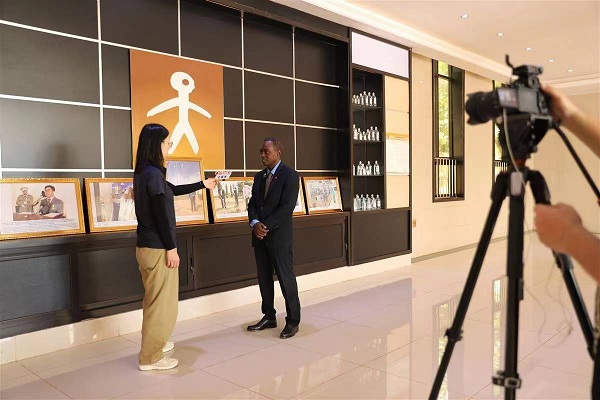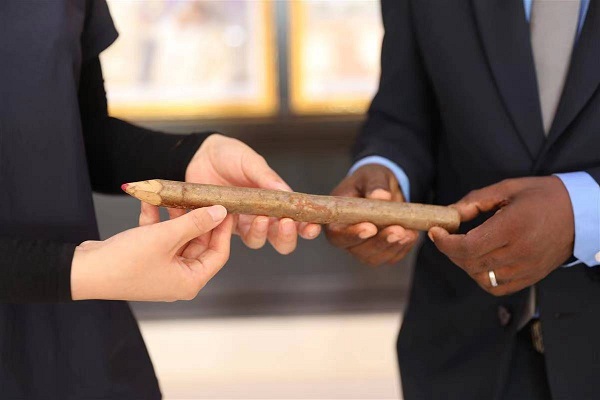Following the Belt and Road with Chinese chimes: Feeling the 'Pure Spirit' in Africa

Hubei Daily reporter interviewing Oumar. [Photo/Hubei Daily]
On Oct 25, the day before I returned from Mali, I gave a local friend the "chime" pendant that had accompanied me throughout my trip to Africa.
His name was Oumar, a Malian, and he was an employee of HUMANWELL PHARMA AFRIQUE S.A. Among the interviewees, he particularly impressed me because he spoke fluent Chinese and was also very funny. He often said he was "from Anhui, China," but had been "tanned" in Africa.
Besides that, he likes working at HUMANWELL very much, and he also likes Chinese people very much. On October 24, when I finished my interview and was about to leave HUMANWELL, he stopped me and said he wanted to give me a gift, a nice-looking "giant pencil."

"Giant pencil" is the gift Oumar gives to the reporter. [Photo/Hubei Daily]
He said, "You're a journalist, and I hope you write better stories with it."
Vaguely, I remembered that the pencil was on his desk and that there was a holder for it.
"I got it from an antique store. It's the only one in the world. I'm giving it to you." I knew he was joking, but I could imagine it was one of his treasured artifacts.
I was in a hurry on the interview day and only brought some equipment.
Before returning home, I thought that, in any case, I would give Oumarthe the gift "chime" pendant that I had prepared before I left Mali. On the afternoon of October 25, I went to see him.
"Guess what this is?"
"I think it's kind of like a bell."
"Almost, somewhat similar. It's called Zeng Houyi Chime Bells, a set of musical instruments belonging to the ruler of Zeng State during the Warring States Period (475-221 B.C.). It's in the Hubei Provincial Museum now..."
Oumar took the pendant, like treating a treasure, gently held it in his palm, and kept saying, "It's so beautiful," while appreciating its beauty.
I was happy to see that he liked the gift.
When Oumar left the office, he began to show off to his colleagues, dancing like a child. He was a little embarrassed when he turned around and saw me standing there.
The next day, I began my journey back to China.
When I was waiting for the flight, Oumar sent a message containing a low-definition video.
In the video, he hung the "chime" on his living room wall, which also had his family portrait. He said this gift was precious and should be put in the most prominent place at home.
I replied with emotion, "Thank you, and I wish you all the best in your work."
After sending the message, I thought for a long time. Throughout the interview journey in Africa, I met many locals who may not speak Chinese but are in an excellent financial situation. Still, they all showed us as much respect and affection as possible.
Whenever they saw us on the street, at work, in restaurants, or in hotels, they would greet us with a smile, wave, and say "Ni Hao"(你好), even though the pronunciation was not so standard.
Once, I was particularly impressed. After our interview at a clinic in Mali, they carried a bucket of iced drinks and fruit to give us. Knowing that the items would cost a lot of money, I shook my head and declined. Because of the language barrier, they thought I wanted to avoid drinking cold and hurriedly returned to get the hot tea. Looking at their sincere eyes, I took a big drink.
On the way back, a local Chinese colleague told me it was the highest courtesy they could treat their guests.
Their respect and affection have genuinely made me realize that "the roses in her hand; the flavor in mine."
When we first arrived in Ethiopia, a local driver picked us up. He was so happy to see us Chinese that he changed the music on the car to Chinese and kept talking about things related to China along the way. "This road was built by the Chinese; the Chinese built this bridge; this hospital was aided by the Chinese... Our lives are a lot better because of the Chinese."
He said that if he has a chance in the future, he will come to China to have a look.
In their eyes, the "Belt and Road," open, inclusive, balanced, and win-win cooperation, is an increasingly better life and a bright light illuminating the way ahead.
On October 26, I boarded the plane back to home. At a glance, half of the passengers were Chinese, and half were Africans, who have become connectors of China-Africa friendship while striving for their own happy lives.


